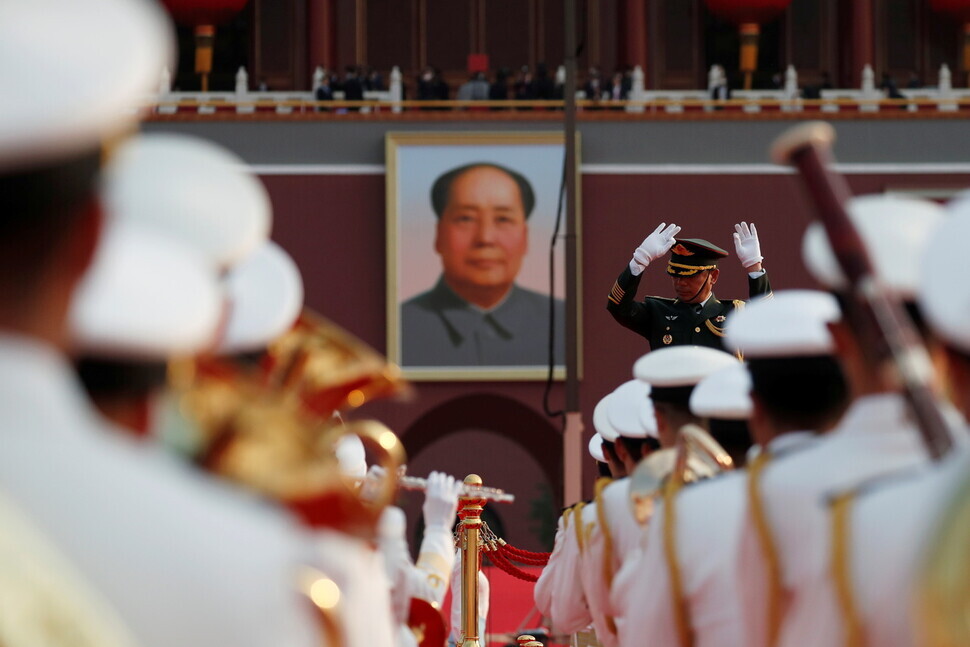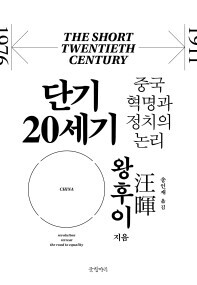hankyoreh
Links to other country sites 다른 나라 사이트 링크
[Book review] “China’s Twentieth Century” names “actively political nature” as China’s key 20th-century legacy


The historian Eric Hobsbawm used the term “the short 20th century” to refer to the period that started with the outbreak of World War I in 1914 and continued to the end of the Cold War, as symbolized by the disintegration of the Soviet Union and Eastern Bloc in 1991.
He described this as an “age of extremes.” It was clearly distinct from the “long 19th century” as defined in his trilogy of books — “The Age of Revolution,” “The Age of Capital” and “The Age of Empire” — about the formation of the modern area amid two revolutions, bourgeois and Industrial.
This is also the point of departure for the main critical perspective shared by Wang Hui, 62, who is the most renowned critical intellectual in China today. Turning our attention to Asia in general and China in particular, we see that in the “short 20th century,” there has been quite a long revolution compared to Europe’s.
In that sense, Wang defines the “short 20th century” as the period from 1911 to 1976, during which China achieved a revolution while maintaining continuity as a sovereign state. His focus here is on discovering ideas here to prepare for the future.
“China’s Twentieth Century,” which was recently released in Korean translation, is a collection of academic papers, lectures, and presentations by Wang from 2000 to 2018 on the theme of “20th century China.”
The book was originally published in 2015. The newly published Korean edition has been drawing attention for its inclusion of a new introduction and first chapter at the author’s request, based on texts written between 2017 and 2018. Those texts are also the introduction and first chapter of “Birth of a Century,” the first part of a “20th Century China” trilogy published by Wang in China in June 2020.
As the translator explains, the title and composition of the series “show that Wang Hui’s interest currently lies in organizing and reexamining his past discussions of modern Chinese ideas around the theme of ‘20th century China.’”
While “The Rise of Modern Chinese Thought” (2004) — which is seen as Wang’s masterwork — was an exploration of Chinese intellectual resources from ancient times to the modern and contemporary eras, his new “20th Century China” series “picks up where that left off for a focused exploration of 20th century China and its political process.”
In the Korean edition’s newly published introduction and first chapter, Wang focuses on elucidating the concept of the “century.” China did not have the kind of 19th century that Europe did, in which the modern era was formed.
Moreover, it did not even have the concept of a “century.” The idea of the century began with the 20th century — so the century was the 20th century. “To find a Chinese parallel to the 19th century in Europe, one that is independent and difficult to name, we must turn our attention to the 20th century, which was both a continuation and a repudiation of the 19th.”
Of particular importance here is the fact that the 20th century ushered in a “synchronic relationship of global scope.” The conditions of the 20th century were those of “horizontal relationships of multilayered time,” which could not be divided along simple lines of old/new or East/West and arranged along a single, unified axis.
It is against this backdrop that China came to develop its “double revolution,” in an attempt to establish its temporal and spatial bearings at a global level and overcome the layers of inequalities and contradictions represented by imperialism and the feudal system: “The concept of the century symbolizes the birth of a universal historical perspective, as well as a contemplation of the imbalances within that universal perspective and the contradictions and collisions that arise there.”
Wang focuses on the ways in which China achieved “revolution” — a socialist regime in response to capitalism — and “continuity” — a sovereign state in response to imperialism — in its response to this century. As a key legacy, he singles out its “actively political nature.”
“China created a single sovereign republic on the foundation of a multiethnic empire; it defined a new politics through a cultural movement of repudiating political parties and the state; and it created a form of politics that is distinct from the parties and states of 19th century Europe,” he observes.
Wang also emphasizes that this was not something drawn directly from China’s practical conditions but rather the product of creative energy to confront the century and transcend its objective conditions. Since it was obliged to deal with the problems of “national politics” that arose in 19th century Europe, 20th century China drew upon its high level of political energy to form a new system: the “party-state,” led by the political party as a mediator situated between the state and the people.
In this context, culture was every bit as important as politics in furnishing a driving force for creating political agency within and outside the state. The unique situation of 20th century China was the result of an “approach in which culture and politics were distinguished, with culture intervening in and inciting politics.”
What is the significance of pondering China’s “short 20th century” at the present moment? As a critical intellectual, Wang focuses his critique on the “post-political” tendency of today, when the “actively political” legacy has been depleted.
With no more debate taking place, the focus of “revolution and construction” has been solely on construction — with the revolution aspect removed — and China’s “party-state” system has been replaced by a “state-party” one in which the party and state are essentially one and the same.
“Over the past 30 years, China has already shifted from the planned economy system to a market society model, and from a focus on ‘global revolution’ to the most vigorous form of capital activity,” he writes. “Once a Third World state resisting imperialist hegemons, it has now become their ‘strategic partner’ and rival, moving from a society proceeding toward the elimination of class to one of restratification.”
According to Wang, this kind of post-political trend is a new historical condition not only for China but for the entire world. At root, he attributes the crisis to splintering of “representativeness,” where political and social forms are at odds under the influence of factors such as capitalist globalization.
Overcoming this post-politicization will require re-politicization, reawakening proactive roles for people as agents. Wang proposes that we look to the legacy of the last century to find the resources we need for this re-politicization.
In particular, he comments that the “futuristic aspect of 20th-century politics appears to lie in the logic of opposing or negating the self.”
The key legacy of China’s “short 20th century” is how it always managed to discover new energy in this logic of self-opposition and negation — for example, by embracing the tasks of the 19th century while also critiquing, discarding, and transcending them.
But as the Cultural Revolution ended and China moved into the 1970s, this self-opposition and negation rapidly gave way to a “new era of self-affirmation,” — which has continued through today.
By Choi Won-hyung, staff reporter
Please direct comments or questions to [english@hani.co.kr]

Editorial・opinion
![[Editorial] Intensifying US-China rivalry means Seoul must address uncertainty with Beijing sooner than later [Editorial] Intensifying US-China rivalry means Seoul must address uncertainty with Beijing sooner than later](https://flexible.img.hani.co.kr/flexible/normal/500/300/imgdb/original/2024/0517/8117159322045222.jpg) [Editorial] Intensifying US-China rivalry means Seoul must address uncertainty with Beijing sooner than later
[Editorial] Intensifying US-China rivalry means Seoul must address uncertainty with Beijing sooner than later![[Column] When ‘fairness’ means hate and violence [Column] When ‘fairness’ means hate and violence](https://flexible.img.hani.co.kr/flexible/normal/500/300/imgdb/original/2024/0516/7417158465908824.jpg) [Column] When ‘fairness’ means hate and violence
[Column] When ‘fairness’ means hate and violence- [Editorial] Yoon must stop abusing authority to shield himself from investigation
- [Column] US troop withdrawal from Korea could be the Acheson Line all over
- [Column] How to win back readers who’ve turned to YouTube for news
- [Column] Welcome to the president’s pity party
- [Editorial] Korea must respond firmly to Japan’s attempt to usurp Line
- [Editorial] Transfers of prosecutors investigating Korea’s first lady send chilling message
- [Column] Will Seoul’s ties with Moscow really recover on their own?
- [Column] Samsung’s ‘lost decade’ and Lee Jae-yong’s mismatched chopsticks
Most viewed articles
- 1[Editorial] Transfers of prosecutors investigating Korea’s first lady send chilling message
- 2[Exclusive] Unearthed memo suggests Gwangju Uprising missing may have been cremated
- 3[Editorial] Intensifying US-China rivalry means Seoul must address uncertainty with Beijing sooner t
- 4S. Korea “monitoring developments” after report of secret Chinese police station in Seoul
- 5[Column] US troop withdrawal from Korea could be the Acheson Line all over
- 6Could Korea’s Naver lose control of Line to Japan?
- 7Xi, Putin ‘oppose acts of military intimidation’ against N. Korea by US in joint statement
- 8‘Shot, stabbed, piled on a truck’: Mystery of missing dead at Gwangju Prison
- 9Korea’s first openly trans athlete hopes to prompt a discussion by competing as herself
- 10Korea poised to overtake Taiwan as world’s No. 2 chip producer by 2032